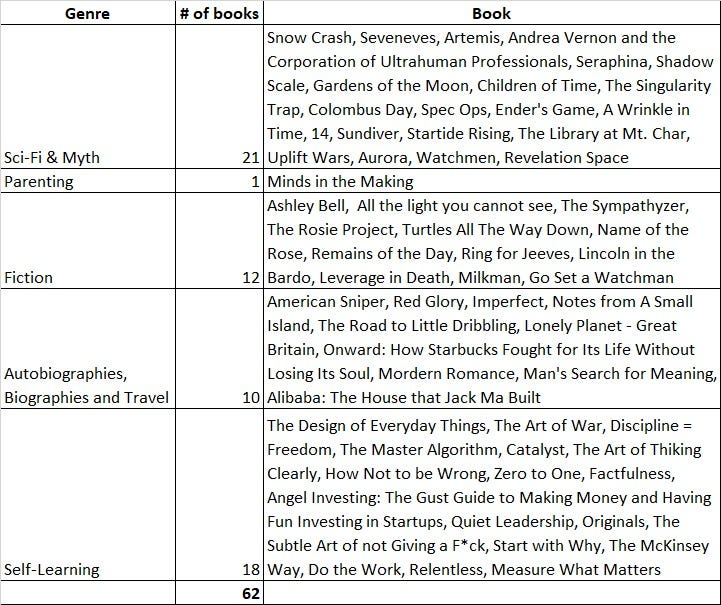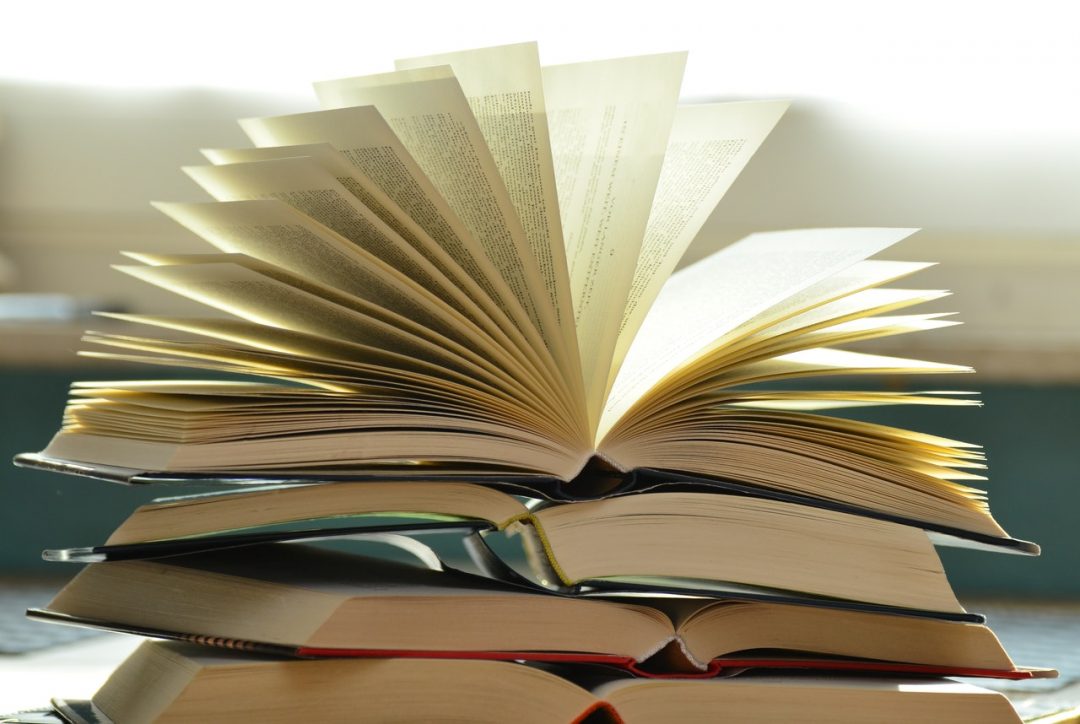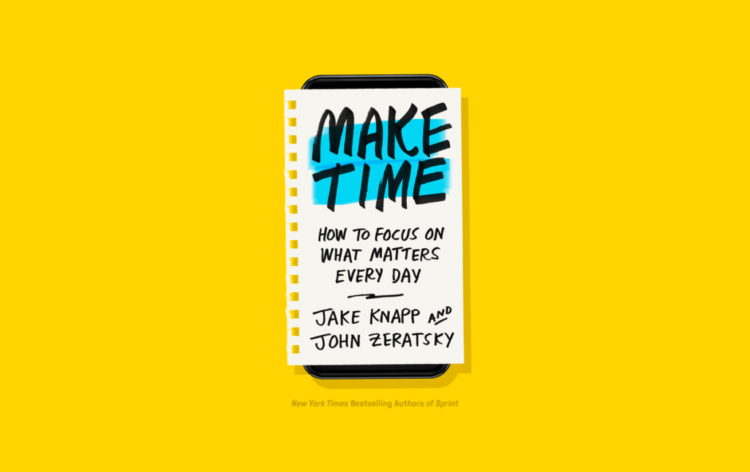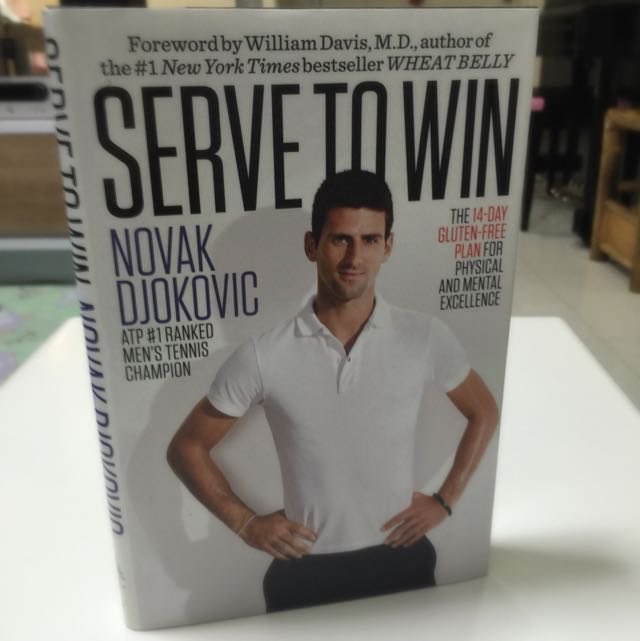
My first blog of the year is actually a look back at last year — specifically the best 5 books I read last year. When I recently shared my list of books from last year (list here), a lot of people asked me about the best of the lot. Having promised to share the list with them, this has been long due.
Not only am I an avid reader, but I am also a very eclectic reader. My reading includes books that range from autobiographies (from all fields) to business books, acclaimed fiction, potboilers, and sci-fi. Both my reading list and my favorite books of the year will reflect that.
Sharing my list here without much more ado, and ranked alphabetically:
1. Factfulness by Hans Rosling

I picked up this book as it came highly recommended by Bill Gates and a legion of TEDx watchers who have made Rosling’s talk one of the most watched TEDx videos ever. In fact, this one of the few books that is able to take an idea/thought and expand on it without making it repetitive and boring. I also loved the book for the positive approach it brings to modern life.
For a lot of us who have been following doomsday scenarios on popular media, this book brings a really fresh perspective. The paradox he highlights: the image of a dangerous world has never been broadcast more effectively than now, while the world has never been less violent and more safe. With the help of numbers and figures, Rosling demonstrates that we actually live in one of the safest periods in human history and what are the key underlying factors to improve the condition of humanity even further.
For example, until 1800, women gave birth to six children on average. On average, four out of six children died before becoming parents themselves, leaving just two surviving children to parent the next generation. There was a balance. It wasn’t because humans lived in balance with nature. Humans died in balance with nature. It was utterly brutal and tragic. Today, humanity is once again reaching a balance. The number of parents is no longer increasing. But this balance is dramatically different from the old balance. The new balance is nice: the typical parents have two children, and neither of them dies. For the first time in history, we live in balance with nature. Another point that stuck with me was that while we are in a bad state right now, we are also improving — much like a child that can be in critical care but whose condition is improving.
For anyone who wants to understand more about the world and our place in it, it is an essential read.
2. Measure what Matters by John Doerr

I have had a lot of books recommended to me about working on startups, but usually, I find it very difficult to get my hands on a book that I can make easily implementable and where I can transfer the leanings to everyday life. MwM is one of those rare books that not only resonates but has a ton of practical tips that you can implement immediately in your business, in whole or in part.
As an early investor in Amazon, Google, Twitter, Compaq, Sun Microsystems and many other tech companies and the chair at Kleiner Perkins (one of Silicon Valley’s hallowed names), you could say John Doerr knows a thing or two about investing in startups. And when he shares an idea that he promises can deliver 10x growth, you better listen. Measure What Matters is his take on OKRs (Objectives and Key Results) and with a ton of impressive examples, he provides a handy framework for startups to structure themselves to drive focus, alignment, and change in their organizations.
3. Onward: How Starbucks Fought for Its Life Without Losing Its Soul by Howard Schulz

One of the best autobiographical books I read all year. The Starbucks success story is visible for all to see. What may not be visible is how, after a great start, the company had to reinvent itself, not only in terms of the business but also in terms of finding its soul. It’s about how a founder often has to re-wear the same hat he had left behind in order to save his company.
After decades of explosive growth during which Starbucks became a household name and the largest coffee company in the world, Schulz stepped down as the CEO in 2000 to be replaced by a professional CEO who had been handpicked by him along with the board. What followed was a lot of turbulence at a time when the global economy was also in a turmoil. As Schulz put it, “By 2007, Starbucks has begun to fail itself. Obsessed with growth, we took our eyes off our operations and became distracted from the core of our business. No single bad decision or person or tactic was to blame. The damage was slow and quiet, incremental, like a single loose thread that unravels a sweater inch by inch. Decision by decision, store by store, customer by customer, Starbucks was losing some of the signature traits it had been founded on.”
It was time for Schulz to come back and protect what he had so passionately built. What follows is his account of the next 3 years at the helm of Starbucks as he fights to reinstate the culture that drove their growth, and at the end of which they emerged stronger than ever. Its a great insight into the mindset of an entrepreneur, his doubts, his convictions and his inner demons which are laid bare by hard gritty choices.
4. Snow Crash by Neal Stephenson

As a lover of sci-fi, I usually get in a fair share of highly recommended science fiction novels into my reading list in a year. I also find that as a genre sci-fi lends itself well to the audiobook format. No sci-fi book I read this year was better than snow crash. An old classic (I picked it up after Satya Nadella called it out as one of the early books that inspired him) the sheer breadth of the book and the new tech it foresaw is breathtaking — among other things the term avatar for online virtual bodies was popularized by this book and many virtual globe programs, including NASA World Wind and Google Earth, bear a resemblance to the “Earth” software developed by the Central Intelligence Corporation in Snow Crash.
As for the book itself, it is a great rip-roaring read which I was able to finish in a couple of days despite the length and is an instant addition to my list of sci-fi classics.
5. The Library at Mount Char by Scott Hawkins

Fantasy is another genre I usually find highly engrossing — Lord of the Rings remains my all time favorite book — but I had not picked up anything in this genre for quite some time. The Library at Mount Char, therefore, came as a very pleasant surprise. Enormous in its scope and one of the most original concepts I have read in years, this is one book that will leave you thinking and will seep into your dreams in the days after you read it. After all, how do you train someone to take over from God?
These were my five favorite books for the year. Please free to share yours in comments below. Wish you all a year full of happy reading!




